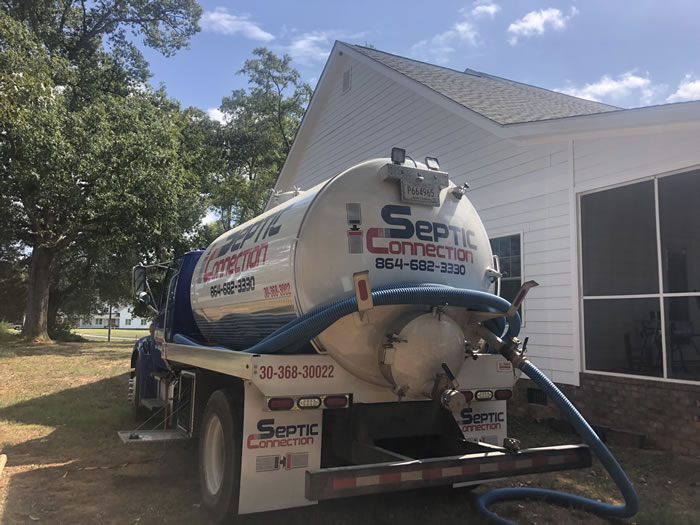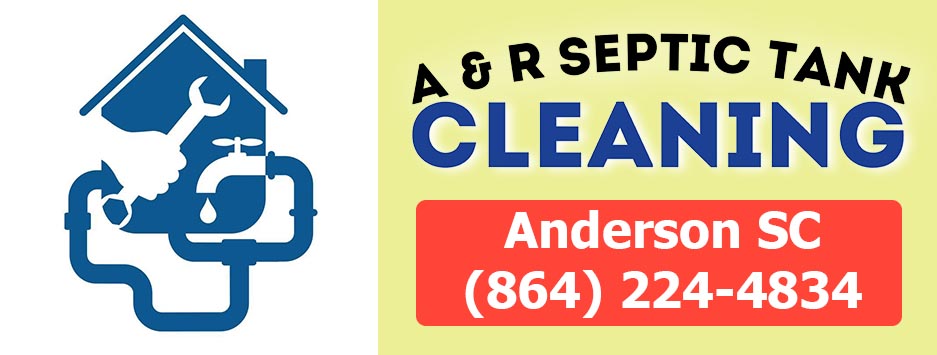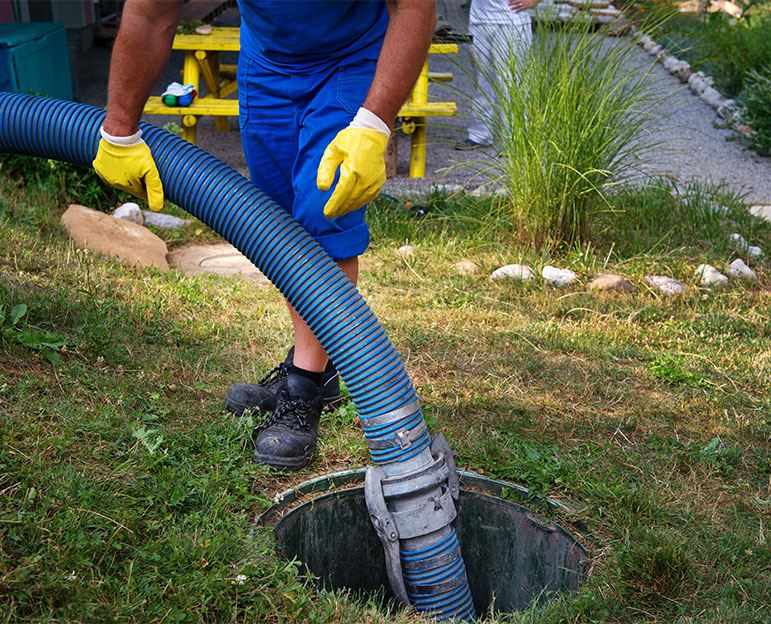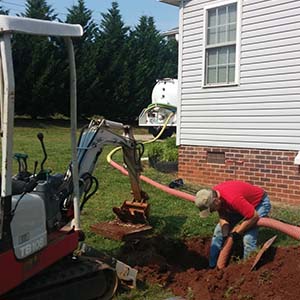If you’re in need of septic tank cleaning services in Anderson, look no further. Maintaining a clean and functional septic tank is crucial for the health of your property and the environment. With our experienced team of professionals, we offer reliable and efficient septic tank cleaning services that will ensure your system is in top shape. From regular maintenance to emergency cleanings, we’ve got you covered. Trust us to handle all your septic tank cleaning needs in Anderson.

Why Septic Tank Cleaning is Important
Prevent Health Hazards
Regular septic tank cleaning is crucial to prevent health hazards. When the tank is not cleaned regularly, the accumulation of solid waste and bacteria can lead to the release of harmful gases and toxins. These can seep into the surrounding soil and water sources, posing a threat to both humans and the environment. By ensuring regular cleaning, you can prevent the spread of diseases and protect the health of your family and community.
Avoid Costly Repairs
Neglecting septic tank cleaning can lead to costly repairs in the long run. When the tank becomes overloaded with solid waste, it can clog the system, causing backups and blockages in the pipes and drains. This can lead to sewage backups in your home or property, resulting in extensive damage and costly repairs. By investing in regular cleaning, you can avoid these issues and save yourself from the financial burden of major repairs.
Maintain Proper Functioning
Regular septic tank cleaning helps to maintain the proper functioning of the septic system. Over time, solid waste accumulates in the tank, reducing its capacity to hold wastewater. This can lead to the premature failure of the system, requiring replacement. By cleaning the tank on a routine basis, you can ensure that it operates efficiently and effectively, prolonging its lifespan and saving you from the inconvenience and expense of system failure.
Signs Your Septic Tank Needs Cleaning
Slow Drains and Flushing
One of the first signs that your septic tank needs cleaning is slow drains and flushing. If you notice that water is taking longer to drain from your sinks, showers, or toilets, it may be an indication that the tank is full and in need of cleaning. Ignoring this sign can result in further clogs and backups, leading to a more serious and costly problem.
Foul Odors
Another clear indicator of a septic tank in need of cleaning is the presence of foul odors. If you detect a strong smell of sewage or rotten eggs near your septic tank or drain field, it may be a sign that the tank is overloaded and needs immediate attention. These odors can not only be unpleasant but also a health risk, making it important to address the issue promptly.
Pooling Water or Wet Spots
Pooling water or wet spots in your yard can also signal a septic tank that requires cleaning. When the tank is full and unable to hold additional wastewater, it may cause water to pool on the surface, particularly around the drain field. This can indicate a problem with the drainage system and should be addressed to prevent further damage to the septic system and surrounding area.
Gurgling Sounds
If you hear gurgling sounds when you flush the toilet or run water down the drain, it may be a sign that your septic tank needs cleaning. The gurgling noises are caused by air trying to escape through blocked pipes or a full septic tank. It is important to address this issue promptly to avoid more severe problems such as sewage backups or pipe damage.
Factors to Consider When Hiring a Septic Tank Cleaning Service
Experience and Expertise
When hiring a septic tank cleaning service, it is important to consider their experience and expertise. Look for a company that has been in business for a significant amount of time and has a proven track record of providing quality services. Experienced professionals will have the necessary knowledge and skills to efficiently clean your septic tank and address any potential issues that may arise.
License and Certification
Ensure that the septic tank cleaning service you hire is licensed and certified. This indicates that they have met the required standards and regulations set by the authorities. Hiring a licensed and certified company gives you the assurance that they are qualified and capable of performing the job safely and effectively.
Customer Reviews and Reputation
Before making a decision, take the time to read customer reviews and assess the reputation of the septic tank cleaning service. Look for positive feedback from previous customers regarding their professionalism, reliability, and quality of work. A reputable company will have a strong reputation built on providing excellent customer service and satisfactory results.
Availability and Response Time
Septic emergencies can happen at any time, so it is important to hire a cleaning service that is available and responsive. Inquire about their availability for emergencies and their response time. A prompt response is crucial when dealing with septic issues to prevent further damage and mitigate potential health risks.
Price and Service Packages
Consider the pricing and service packages offered by different septic tank cleaning companies. While it is important to find a service within your budget, be cautious of extremely low prices as they may indicate subpar quality of work. Request quotes from multiple companies and compare the services included in their packages to ensure you are getting the best value for your money.
Different Methods of Septic Tank Cleaning
Traditional Pumping
Traditional pumping is the most common method of septic tank cleaning. It involves the use of specialized equipment to pump out the solid waste and wastewater from the tank. The contents are then transported to an approved disposal site. This method is effective in removing the accumulated waste and restoring the tank’s capacity.
Mechanical Agitation
Mechanical agitation is another method used for septic tank cleaning, particularly for heavily clogged systems. It utilizes powerful mechanical devices to agitate the solid waste and break it down, making it easier to pump out. This method is often recommended when the tank has not been cleaned for an extended period and requires more thorough cleaning.
Chemical Treatment
Chemical treatment involves the use of specialized chemicals to break down and liquefy the solid waste in the septic tank. These chemicals aid in the decomposition process, making it easier to remove the waste during pumping. Chemical treatments can help restore the tank’s proper functioning and extend its lifespan.
Biological Treatment
Biological treatment utilizes natural bacteria and enzymes to break down the solid waste in the septic tank. The bacteria feed on the waste, converting it into harmless byproducts. This method is considered more environmentally friendly and can help restore the natural balance of bacteria in the tank. However, it may take longer to achieve the desired results compared to other cleaning methods.

Septic Tank Cleaning Frequency
Depends on Household Size
The frequency of septic tank cleaning depends on the size of your household. Larger households tend to generate more wastewater, leading to a faster accumulation of solid waste in the tank. As a general guideline, it is recommended to clean the septic tank every 3 to 5 years for an average-sized family. However, households with more occupants may need more frequent cleaning, while smaller households may be able to wait longer between cleanings.
Depends on Water Usage
Water usage also plays a role in determining septic tank cleaning frequency. The more water you use, the faster the tank will fill up with wastewater and solid waste. Activities such as doing multiple loads of laundry in a day, taking long showers, or excessive water usage in general can contribute to a higher accumulation rate. If your household has high water usage, you may need to clean the tank more frequently.
Depends on Tank Size
The size of your septic tank is an important factor in determining the cleaning frequency. Smaller tanks have a limited capacity and can fill up quickly, especially if you have a larger household or high water usage. If your tank is smaller than the recommended size for your household, you may need to clean it more frequently to ensure proper functioning.
Steps Involved in Septic Tank Cleaning
Septic Tank Inspection
Before starting the cleaning process, a thorough inspection of the septic tank is conducted. This involves checking for any signs of damage or blockages, measuring the sludge and scum levels, and assessing the overall condition of the tank. The inspection helps the cleaning service determine the appropriate cleaning method and identify any potential issues that may need further attention.
Pumping of the Tank
Once the inspection is complete, the next step is to pump out the contents of the septic tank. This is done using specialized equipment and pumps, which suction out the solid waste and wastewater from the tank. The pumping process removes the accumulated waste, allowing for a clean and empty tank.
Removing Solid Waste
After pumping out the tank, the solid waste is carefully and safely disposed of. The waste is transported to an approved facility for proper treatment and disposal. It is important to ensure that the waste is handled and disposed of according to local regulations and guidelines to prevent any harm to the environment.
Cleaning and Flushing
After the solid waste is removed, the septic tank is cleaned and flushed to remove any remaining residue. This is done using water and high-pressure jets to thoroughly clean the tank’s interior surfaces and remove any build-up. Cleaning helps to restore the tank’s capacity and improve its overall functioning.
Tank Integrity Check
Once the cleaning and flushing are complete, a final tank integrity check is conducted. This involves ensuring that the tank is in good condition, with no cracks, leaks, or other structural issues. If any problems are identified, they can be addressed promptly to prevent further damage and ensure the long-term integrity of the tank.

Importance of Professional Septic Tank Cleaning
Proper Equipment and Safety Measures
Professional septic tank cleaning services have the necessary equipment and tools to safely and efficiently clean your tank. They are equipped with pumps, hoses, and other specialized tools that are designed for septic tank cleaning. They also follow strict safety measures to protect themselves and your property during the cleaning process.
Knowledge of Local Regulations
Professional septic tank cleaning companies have a thorough understanding of local regulations and guidelines regarding waste disposal and septic system maintenance. They ensure that the cleaning process is carried out in compliance with these regulations, preventing any legal issues or environmental harm.
Thorough Cleaning and Maintenance
By hiring professionals, you can be assured of a thorough and comprehensive cleaning of your septic tank. They have the expertise to remove all the accumulated waste, ensuring a clean and well-functioning tank. Additionally, professional cleaning services often offer maintenance plans to help you keep your septic system in optimal condition, providing peace of mind and ongoing support.
Reduced Risk of Damage
Attempting to clean a septic tank on your own can be risky and may result in damage to the tank or your property. Hiring professionals reduces this risk. They have the knowledge and experience to handle the cleaning process properly and safely, minimizing the chances of accidents or costly mistakes.
Questions to Ask a Septic Tank Cleaning Company
When hiring a septic tank cleaning company, it is important to ask the following questions:
Are you licensed and insured?
Ensure that the company is licensed and insured to protect yourself from liability in case of any accidents or damages during the cleaning process.
How long have you been in business?
Inquire about the company’s experience and how long they have been providing septic tank cleaning services. A well-established company with a long-standing reputation is typically more reliable and trustworthy.
What cleaning methods do you use?
Ask about the specific cleaning methods the company utilizes. Different methods may be suitable for different situations, so it is important to understand the approach they will take to clean your septic tank.
Do you offer emergency services?
Find out if the company offers emergency septic tank cleaning services. Septic emergencies can happen unexpectedly, and it is crucial to have a service provider who can respond promptly to minimize damage and health risks.
Can you provide references?
Ask for references from previous customers to assess the company’s reputation and quality of work. Contacting these references can provide valuable insights into the company’s professionalism and customer satisfaction.
What is your pricing and payment policy?
Inquire about the company’s pricing structure and payment policy. Understand the fees associated with the cleaning service and any additional charges that may apply. Clarify how payment is to be made and ensure it aligns with your budget and preferences.
Do you provide maintenance services?
Ask if the company offers ongoing maintenance services to help you keep your septic system in good condition. Regular maintenance is important to prevent issues and extend the lifespan of your septic tank.

Tips for Maintaining a Healthy Septic System
Regular Pumping and Cleaning
Schedule regular septic tank pumping and cleaning to ensure the system operates efficiently. Follow the recommended guidelines for cleaning frequency based on your household size, water usage, and tank capacity.
Proper Waste Disposal
Be mindful of what you flush down the drains and toilets. Avoid disposing of non-biodegradable items, grease, oil, medications, chemicals, or excessive amounts of food waste. These can clog the system and hinder proper decomposition.
Water Conservation
Conserve water to reduce the strain on your septic system. Fix leaky faucets, install low-flow fixtures, and practice water-saving habits such as taking shorter showers and running full loads in the dishwasher and washing machine.
Avoid Harsh Chemicals
Harsh chemicals can disrupt the natural balance of bacteria in the septic tank and hinder the decomposition process. Use septic-safe cleaning products and avoid excessive use of bleach, antibacterial soaps, and other chemicals that can harm the bacterial activity.
Regular Inspections
Schedule routine inspections of your septic system to identify any potential issues early on. Detecting problems such as leaks or blockages promptly can help prevent major damage and costly repairs.
Landscaping Considerations
Take care when planning your landscaping to avoid placing heavy objects or structures over the septic tank and drain field. Avoid planting trees with invasive root systems that can damage the pipes and tank. Consult with a professional if you are unsure about the appropriate landscaping for your septic system.
Conclusion
Regular septic tank cleaning is essential for maintaining a healthy and properly functioning septic system. By preventing health hazards, avoiding costly repairs, and ensuring optimal performance, regular cleaning helps to protect your health, environment, and finances. When hiring a septic tank cleaning service, consider factors such as their experience, license, customer reviews, availability, and pricing. Different cleaning methods, such as traditional pumping, mechanical agitation, chemical treatment, and biological treatment, can be used depending on the specific situation. The frequency of septic tank cleaning depends on the household size, water usage, and tank size. Professional cleaning services offer various benefits, including proper equipment, knowledge of local regulations, thorough cleaning and maintenance, and reduced risk of damage. When hiring a company, ask relevant questions and consider their licensing, experience, cleaning methods, emergency services, references, pricing, and maintenance offerings. To maintain a healthy septic system, practice regular pumping, proper waste disposal, water conservation, avoidance of harsh chemicals, regular inspections, and appropriate landscaping considerations. Taking care of your septic system ensures its longevity and trouble-free operation.

